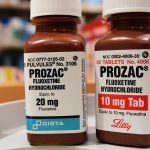What Does Prozac Feel Like When It Starts Working?

What is Prozac?
Prozac is a brand of fluoxetine, a selective serotonin reuptake inhibitor (SSRI) antidepressant used to treat major depressive disorder, bulimia nervosa (an eating disorder), obsessive-compulsive disorder, panic disorder, and premenstrual dysphoric disorder (PMDD).
Prozac is sometimes used together with another medication called olanzapine (Zyprexa) to treat manic depression caused by bipolar disorder. This combination is also used to treat depression after at least 2 other medications have been tried without successful treatment of symptoms.
Prozac first appeared in the U.S. in 1988 and it became one of the most widely prescribed antidepressants in the country. It remains popular, although newer drugs are now available, such as sertraline and citalopram.
It is available as a liquid, tablet, capsule, and as a delayed-release, long-acting capsule. It is suitable for adults and it can be used in some cases for children over the age of 10 years.
How does Prozac work?
Fluoxetine is in a class of medications called selective serotonin reuptake inhibitors (SSRIs). Prozac works by increasing the amount of serotonin, a natural substance in the brain that helps maintain mental balance this enables the communication between brain cells and helps people with depression, panic, anxiety, or obsessive-compulsive symptoms.
How should Prozac (Fluoxetine) be used?
Prozac (Fluoxetine) comes as a capsule, a tablet, a delayed-release (releases the medication in the intestine) capsule, and a solution (liquid) to take by mouth. Fluoxetine may be taken with or without food. Fluoxetine (Sarafem) comes as a capsule to take by mouth. Prozac (Fluoxetine) capsules, tablets, and liquid are usually taken once a day in the morning or twice a day in the morning and at noon. Fluoxetine delayed-release capsules are usually taken once a week. Fluoxetine (Sarafem) is usually taken once a day, either every day of the month or on certain days of the month. Take fluoxetine at around the same time(s) every day. Follow the directions on your prescription label carefully, and ask your doctor or pharmacist to explain any part you do not understand. Take fluoxetine exactly as directed. Do not take more or less of it or take it more often than prescribed by your doctor.
Swallow the delayed-release capsules whole; do not cut, crush, or chew them. Your doctor may start you on a low dose of fluoxetine and gradually increase your dose.
What Does Prozac Feel Like When It Starts Working?
When Prozac starts working, you may feel a little more energy, your sleep pattern improves, and sometimes your appetite gets better all these happens usually within the first two weeks. However, it may take 4 to 5 weeks or longer before you feel the full benefit of Prozac.
Prozac stays in the body for 25 days after you stop taking it. Even then, the prescription is only 99 percent out of your system. These factors are after the patient stops taking Prozac altogether.
Although the Prozac will mostly be gone after 25 days, some metabolites are excreted into your system if you have been taking Prozac for more than 22 days. These secretions can stay in your system for anywhere from 22 days to 82 and a half days, depending on various factors.
Continue to take Prozac even if you feel well. Do not stop taking Prozac without talking to your doctor. If you suddenly stop taking Prozac, you may experience withdrawal symptoms such as mood changes, irritability, agitation, dizziness, numbness or tingling in the hands or feet, anxiety, sweating, confusion, headache, tiredness, and difficulty falling asleep or staying asleep. Your doctor will probably decrease your dose gradually
For many people, finding the right depression treatment is a trial-and-error process. Prozac may work well for one person but not at all for someone else — and experts don’t yet have ways to predict this.
In other cases, a person may start to feel better on Prozac, but the side effects are too bothersome for them to keep taking it. One way to improve your chances of finding if Prozac is best for you is by looking out for the listed signs that show that the medication is working well enough for you.
What are the side effects of Prozac?
Prozac may cause side effects. Tell your doctor if any of these symptoms are severe or do not go away:
- nervousness
- anxiety
- difficulty falling asleep or staying asleep
- nausea
- diarrhea
- dry mouth
- heartburn
- yawning
- weakness
- uncontrollable shaking of a part of the body
- loss of appetite
- weight loss
- changes in sex drive or ability
- excessive sweating
- headache, confusion, weakness, difficulty concentrating, or memory problems
Some side effects can be serious. If you experience any of the following symptoms, call your doctor immediately:
- rash
- hives or blisters
- itching
- fever
- joint pain
- swelling of the face, throat, tongue, lips, eyes, hands, feet, ankles, or lower legs
- difficulty breathing or swallowing
- agitation, fever, sweating, confusion, fast or irregular heartbeat, shivering, severe muscle stiffness or twitching, hallucinations, loss of coordination, nausea, vomiting, or diarrhea
- fast, slow, or irregular heartbeat
- shortness of breath
- dizziness or fainting
- seizures
- abnormal bleeding or bruising
Prozac may decrease appetite and cause weight loss in children. Your child’s doctor will watch his or her growth carefully. Talk to your child’s doctor if you have concerns about your child’s growth or weight while he or she is taking this medication. Talk to your child’s doctor about the risks of giving fluoxetine to your child.
Prozac may cause other side effects. Call your doctor if you have any unusual problems while taking this medication.
If you experience a serious side effect, you or your doctor may send a report to the Food and Drug Administration’s (FDA) MedWatch Adverse Event Reporting program online (http://www.fda.gov/Safety/MedWatch) or by phone (1-800-332-1088).





